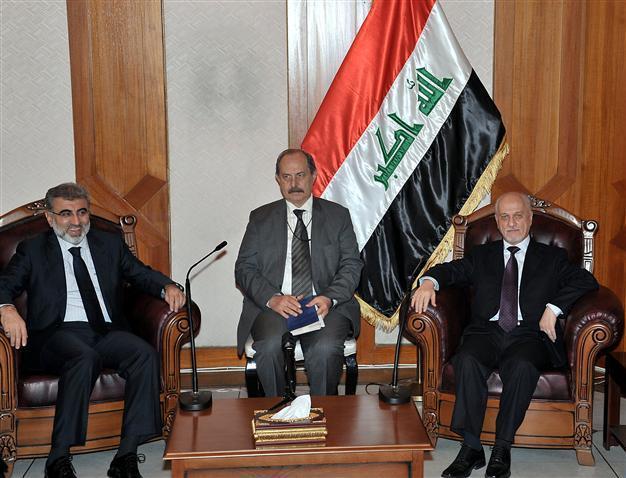Turkey to seek Baghdad's consent for Iraqi Kurdish oil: Energy Minister Yıldız
ANKARA / BAGHDAD

Turkish Energy Minister Taner Yıldız (L) held a key meeting in Baghdad with Iraqi Deputy Prime Minister for Energy Hussain al-Shahristani on Dec. 1. Yıldız will attend Iraqi-Kurdistan Oil and Natural Gas Conference in Arbil starting on Dec. 2. AA photo
Oil exports from anywhere in Iraq to Turkey need the central government's approval, both countries energy ministers’ agreed on Dec. 1 after a key bilateral meeting in Baghdad, which was aimed at diffusing a row over energy exports from Iraq's autonomous Kurdish region.
Yıldız said Turkey would seek Baghdad's approval for the commercial export of oil from the autonomous Kurdistan region following the meeting with Iraqi Deputy Prime Minister for Energy Hussain al-Shahristani.
"We agreed to win the Iraqi central government's consent for oil trade from the KRG to Turkey and to start a cooperation plan to serve the interests of all three parties," a joint declaration from both ministers said.
Al-Shahristani also insisted that Baghdad expected to be consulted about any deal involving the parties. “We will discuss the mechanism,” he told a news conference, adding that he discussed the issues with Yıldız in a “fraternal and transparent” manner.
It was Yıldız's first visit to Iraq since his plane was denied permission to land by Baghdad late last year when he tried to attend an annual energy conference in Arbil.
He traveled to Baghdad after Turkish Foreign Minister Ahmet Davutoğlu convinced his Iraqi counterpart Hoshyar Zebari of the “benefit of face to face discussions.” Davutoğlu was keen to clarify if there were any misimpressions on the Iraqi side regarding the energy cooperation, a Turkish diplomat told the Hürriyet Daily News. He also told Zebari that Turkey wanted to “carry and implement these energy projects under a three-party framework,” the diplomat added.
Yıldız will travel on to Arbil for this year’s edition of the same conference, which starts on Dec. 2.
Pipeline could be extended to Basra During the same press conference on Dec. 1, Yıldız said the two sides had also discussed an existing plan to extend a pipeline to take crude oil from Iraq's southern Basra oil fields to Turkey. He had said in a statement earlier this month that such a line would relieve Iraq’s central government, adding capacity and volume for oil exports.
Yıldız is expected to hold a meeting with the Kurdistan Regional Government (KRG) Natural Resources Minister Ashti Hawrami during the third, three-day Iraqi-Kurdistan Oil and Natural Gas Conference. Both parties are expected to discuss the details of multi-billion-dollar energy deals.
The Turkish energy minister arrived in Arbil early on Dec. 2, where he reiterated that his talks in Baghdad were "positive."
Last week, Turkey signed five trade contracts and one protocol for the exploration of the multi-billion-dollar hydrocarbon resources of northern Iraq, with Iraqi Kurdish Regional Government (KRG) Prime Minister Nechirvan Barzani.
As part of the deal, the state-backed Turkish Energy Company (TEC), which Ankara set up to work in northern Iraq, has signed a contract to operate in 13 exploration blocks. In about half of those, it will team up with U.S. oil giant ExxonMobil.
The move comes amid suggestions that a new pipeline, linked to the existing Kirkuk-Ceyhan line, could begin pumping oil exports from Iraqi Kurdistan as early as next month, infuriating Baghdad, which insists all energy sales should be made via the central government.
However, Iraq retaliated by banning Turkish private jets from its airspace on Nov. 30. The Turkish Foreign Ministry responded with a statement that the deals had not been finalized and that it would seek Baghdad's cooperation.
Al-Shahristani had warned on Nov. 28 that any energy deal with Arbil would be “an encroachment on the sovereignty of Iraq.”
Baghdad says Kurdish efforts towards oil independence could lead to the breakup of Iraq, and the dispute has also raised concern in Washington.
Autonomous since 1991, the KRG has often chafed against the central government and even threatened to secede, but still relies on Baghdad for a slice of the OPEC producer's $100-billion-plus budget.
An additional Reuters story was used in this report.
